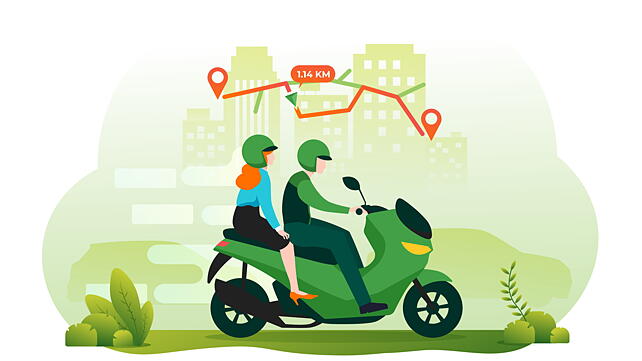
India is the world's second-most populated nation [1], with 1.4 billion people inhabiting the length and breadth of the country. The buildings and houses spread across the city make India one of the world's most vibrant yet densely populated countries. With all this bustle comes the problem of traffic snarls, making it difficult for anyone to drive their way through to their destination.
With increasing dependability and pressure on resources, India remains one of the most challenging countries regarding daily commute. Mumbai, the financial lifeline of the country, has been placed as the world's second-most congested city in terms of traffic jams [2]. With cities packed to the brim, inventive modes of transportation inevitably become the need of the hour to save time and effort during public commutes.
In such scenarios, two-wheelers have emerged as the saviour, swiftly escaping traffic snarls while saving both time and money. With such convenience on offer, we have been witnessing a surge in bike taxi operations for a seamless commute.
Bike Taxi Trend Grows At Affordable Fares
The bike taxi market in India was valued at $50.5 million in 2021 and is projected to touch about $1,478 million by 2030, registering a staggering CAGR of 48.5% [3]. While four-wheeler car taxis are standard, bike taxis are a new mode of transportation, where a driver and his two-wheeler serve the passenger on the pillion.
The services are operated all across Indian cities, and rides are booked using a simple mobile application. Their popularity can be attributed to their promptness and convenience. A bike taxi can zoom its way onto busy and crammed roads. With such inventive services in Indian cities, the problem of booking multiple cabs with long wait times is now done away with. A simple request on the mobile application connects the passenger directly with the nearest rider.
This service is highly suitable for people who have to accomplish many jobs during the day and need multiple stopovers along the route. Rental schemes are also available in bike taxis, where the vehicles along with the rider can be hired for up to six hours [4]. The development of this convenient mobility has just begun, with the fares being economical. A bike taxi can be hired for six hours or 60 km at INR 599.

Reasons For Surge In Bike Taxi Usage
A two-wheeler today is one of the most trusted modes of transportation, which provides last-mile connectivity. There are no places where a bike cannot go, and the riders make sure to drop their passengers off at the exact location. On the contrary, in the case of cabs, last-mile connectivity might be an issue either due to traffic snarls or narrow roads in some residential areas.
In addition, bike taxis have a low carbon footprint, and choosing one before a car will also get the same job done, yet with low greenhouse gas emissions. As the business is evolving, electric bike taxis have also come up.
Two-wheelers comprise about 30% of total electric vehicles registered with the government, riding the upcoming and booming EV market in India. With significant policy shifts, the government's primary focus is on electrifying transportation in the country. Electric two-wheelers save on fuel costs and consume little electricity while charging.
Now, bike taxi companies have begun transitioning their fleet to EVs to make the ride experience even more economical for consumers, while offering enough financial stability for hardworking riders.
Future Of Bike Taxis In India
The future for bike taxi aggregators in India is bright. Not only are they solving a critical commute challenge across the country, but they are doing it at economical costs without many hassles for passengers, unlike cabs. When cab drivers usually refuse bookings for short distances, a bike taxi is that reliable partner, who is ready to pick and drop from anywhere without conditions. This micro-mobility market in India is emerging and is gradually taking an unprecedented pace, especially after the gradual ending of COVID curbs.
A report claims that two-wheelers remain the most popular choice of commuters, with about 79% of all vehicles sold in India being two-wheelers [5]. Further, it is interesting to note that all the commute requirements that aren't met by cabs are now falling into the laps of dependable bike taxi owners. While bike taxis remain a new concept in India, some quarters of the public are making themselves aware and educated about sharing a pillion seat, which was otherwise being wasted.
References:
[1] https://www.statista.com/statistics/262879/countries-with-the-largest-population/
[2] https://www.hindustantimes.com/lifestyle/travel/why-is-india-s-traffic-still-among-the-worst-in-the-world-101615556859851.html
[3] https://www.alliedmarketresearch.com/india-bike-taxi-market-A15920
[4] https://www.financialexpress.com/auto/bike-news/rapido-bike-taxi-launches-rental-service-in-these-6-cities-fare-structure-and-packages-explained-charge-cost-price-duration-how-to-book-delhi-ncr/2191708/
[5] https://inc42.com/features/how-india-became-the-worlds-capital-for-bike-taxis-scooter-rentals/
About the Author: Aravind Sanka is Co-founder of Rapido, an Indian bike taxi aggregator and logistics service provider.